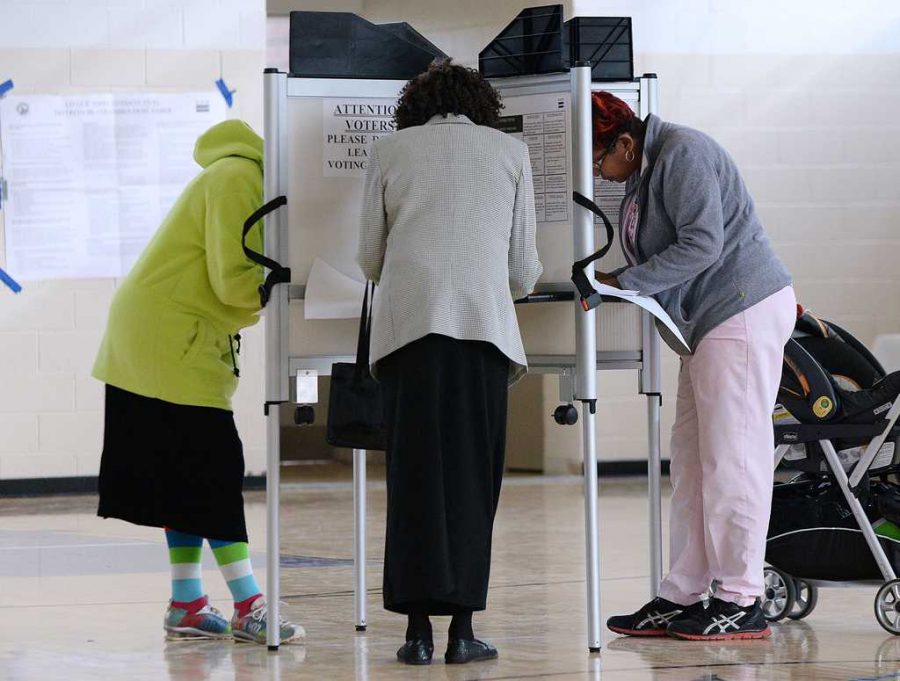With the 2016 presidential election nearing the one-year mark, Pitt’s two major political organizations – the Pitt College Democrats and Pitt College Republicans – are forging separate paths to secure votes.
The Pitt News talked to Republican and Democrat students to map out where the groups’ members stand this election season. In short, while campus Republicans are not supporting the current GOP frontrunner Donald Trump, they’re pushing for GOP hardline issues, like building the Keystone XL pipeline and maintaining Second Amendment rights. College Democrats have voiced support for gun control and minimum wage increases, but have focused more on encouraging students to vote rather than supporting a particular candidate.
The Republicans
Cameron Linton decided he was a Republican when he received his first paycheck.
“Roughly 25 percent of my money was taken out of my check before I even got any money,” Linton said. “I found that ridiculous.”
Now, Linton is president of the Pitt College Republicans, a group that has largely narrowed down its support to presidential hopeful Marco Rubio. The Campus Republicans have also decided against hosting “get out the vote” tactics in the largely democratic atmosphere of a college campus in favor of working with party offices in Pittsburgh.
Linton said about 50 students attended the College Republicans’ first meeting earlier this semester on Sept. 3. At the time, 17 Republicans had announced their bids for the party’s nomination. In order to gauge the members’ support for a specific GOP primary candidate, Linton said the group held a straw poll in which members ranked their top three preferred candidates.
The Republicans allocated points to candidates based on their national poll rankings. According to Linton, Marco Rubio, the junior senator from Florida, had the most points, which Linton attributed to his “charismatic” appeal. In the group’s poll, Ben Carson, the retired neurosurgeon, and John Kasich, the current governor of Ohio, followed behind Rubio.
According to the Real Clear Politics poll, which compiles polling data from Monmouth and the five major news channels in the United States, frontrunner Donald Trump currently has a 6-point lead over Carson, an 18-point lead over Rubio and a 25-point lead over Kasich.
Linton, who personally supports Kasich, said being a student and identifying as a conservative makes him a minority on campus.
In the 2012 presidential election, 67 percent of young people aged 18-29 voted for Obama, compared to just over 35 percent for Romney, according to an analysis from the Center for Information and Research on Civic and Learning Engagement at Tufts University.
“College has traditionally been a place where students are liberal,” Linton said. “As we get older, it is proven that many people actually begin to move right on the political spectrum.”
Overall, Linton is optimistic about the Republicans’ chances in the general election.
“If we nominate a legitimate candidate, Clinton can be beaten,” Linton said.
Much of the news coverage around the Republican primary elections has highlighted controversial current frontrunner Donald Trump. Linton has been unpleasantly surprised by Trump’s continued popularity with Republican voters.
“I hope [support for Trump] peters out,” Linton said, adding that he thought Trump would have dropped out of the race by now. He said he still believes Trump won’t win the Republican nomination, although he has no idea when, or how, Trump’s support will falter.
According to Linton, there is little — if any — pro-Trump sentiment among the Pitt College Republicans.
“Most of us are not large fans of Trump,” Linton said, adding that only one anonymous person voted for Trump in the College Republicans’ September straw poll.
The Democrats
Gabbi Hill, President of Pitt College Democrats, said the group is focusing less on picking a candidate and more on encouraging students to vote. She added that many of the members are currently involved in the upcoming Pennsylvania Supreme Court elections.
On Sept. 20, the College Democrats collaborated with the Black Action Society and Pi Sigma Alpha to register students to vote for National Voter Registration Day through the state’s new online registration form.
“I believe that it is important for college students to vote because decisions that are being made right now are going to be influencing me, my family and the future of their families,” Hill said.
Hill said the group will organize additional “get out the vote” activities in the future, but there are no concrete plans right now.
Based on a straw poll, the majority of Campus Democrat members turned out to be Bernie Sanders supporters.
Stephen Berry, a sophomore, said Sanders is a “genuine” candidate whose views on banks and income inequality have been consistent for the past 30 years, but Berry is hesitant to support a self-proclaimed socialist.
“The word ‘socialist’ scares people,” Berry said.
In light of the upcoming election, Hill said the Campus Democrats mainly discuss foreign policy matters and the economy.
“Of course,” Hill said, “environmental issues are also playing a role in the current discussions of [the 2016 presidential election].”
One environmental concern that democrats at Pitt have taken a stance on is the Keystone XL Pipeline—which, if approved, would carry oil from Canada to Nebraska.
In a campus political debate on Oct. 15, campus democrat Chelcie Alcorn said the possible environmental and social harm the pipeline could have on the United States outweigh any of its benefits.
College Democrat member Jacob Pavlecic, a freshman political science and philosophy major, said he became a Democrat because he “believe[s] that government should actively work to help its citizens.”
Unlike the majority of campus democrats, Pavlecic supports, the current Democratic frontrunner, Hillary Clinton.
“The Republican candidates still have yet to offer any realistic, specific policy details,” Pavlecic said. “Ultimately, Independents will vote for Hillary because she will give details about what she will do in office rather than focus on mere vague promises.”
For an issue-by-issue breakdown of what the Campus Republicans and Campus Democrats discussed at their debate and a rundown of their views, see The Pitt News website.



